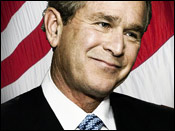
|
When is Torture not Torture? When it's "safe" and "legal," says President Bush
|
President Bush: "Nearly five years have passed since these -- those initial days of shock and sadness -- and we are thankful that the terrorists have not succeeded in launching another attack on our soil. . . Another reason the terrorists have not succeeded is because our government has changed its policies -- and given our military, intelligence, and law enforcement personnel the tools they need to fight this enemy and protect our people and preserve our freedoms.
"
As conspiratoral and unbelievable as it may sound, one has to wonder why Bush is confident enough to boast about Al Qaeda not being able to attack us again. The reader may recall that the day after Bush made his infamous aircraft carrier landing in 2003 and announced to the world that "the mission in Iraq has been accomplished," the Pentagon announced that it was withdrawing all U.S. troops from Saudi Arabia. Just a coincidence you say? Perhaps not. Both before and in the wake of the 9/11 attacks, Osa bin Laden had been boldly announcing via both released videos and Al-Qaeda friendly web sites that his organization would be waging a Jihad (holy war) against the United States until all U.S. troops were out his native country -- which as we all know is Saudi Arabia. Many believe it was the main if not the only reason why bin Laden ordered the 9/11 attacks.
Could there have been a deal struck with bin Laden, perhaps through Saudi intermediaries, in which bin Laden agreed not to lauch attacks on American soil in exchange for a withdrawal of U.S. troops from Saudi Arabia? Or was there perhaps a less formal defacto deal, with Bush pulling out the troops from Saudi Arabia knowing that this might satisfy bin Laden and reduce the dangers of another attack? As wide open to attack as we are, one has to wonder why none have occured here since 9/11?
The president fails to mention that there were no Al Qaeda forces operating in Iraq until AFTER his illegal invasion.
President Bush: "In some cases, we determine that individuals we have captured pose a significant threat, or may have intelligence that we and our allies need to have to prevent new attacks. Many are al Qaeda operatives or Taliban fighters trying to conceal their identities, and they withhold information that could save American lives. In these cases, it has been necessary to move these individuals to an environment where they can be held secretly [sic], questioned by experts, and -- when appropriate -- prosecuted for terrorist acts."
In other words, we kidnap people we don't like and torture them.
Translation: Torturing people is a patriotic duty and necessary to save the Republic, but don't ask me to justify this morally or provide evidence that lives were actually saved or useful information really obtained. We wonder if Bush is aware that no one in our military was ever authorized or ordered by the government or President Roosevelt to torture anyone during WWII, a war which took 250,000 American lives. In point of fact, numerous propoganda movies were made during WWII condemning the inhumane German and Japanese treatment and torture of POWS, and their failure to honor the terms of the Geneva Convention on the treament of war prisoners.
Given the historical precedents, Bush's allegations that the nature of the enemy requires "alternative methods" of interogation (i.e., torture) are baseless. Despite the systemic torture of American POWs by the Japanese, Germans, and later the North Koreans on a grand scale, the U.S. government never authorized the use of torture on its own prisoners. Presidents Roosevelt, Truman, Eisenhower, Kennedy, Johnson, and even Nixon never came before the American people and asked that torture be made legal.
"I cannot describe the specific methods used. . . but they were . . . safe, and lawful, and necessary." One can only cringe when considering why, if the "alternative set of procedures" used to force Zubaydah to talk against his will were "safe" and "lawful," Bush cannot tell us what those procedures were? If there's anyone out there willing to believe these CIA procedures did not involve torture, we have a nice bridge over in Brooklyn we'd like to sell you, real cheap.
President Bush: "This program has been subject to multiple legal reviews by the Department of Justice and CIA lawyers; they've determined it complied with our laws. This program has received strict oversight by the CIA's Inspector General."
Since when has the CIA replaced the authority and review of the Congress and the judiciary? (We're not counting the Justice Department, which answers directly to Bush and Bush alone.
In other words, Bush assumed dictatorial powers, broke the law, and got caught on it.
President Bush: "The United States does not torture. It's against our laws, and it's against our values. I have not authorized it -- and I will not authorize it. Last year, my administration worked with Senator John McCain, and I signed into law the Detainee Treatment Act, which established the legal standard for treatment of detainees wherever they are held. I support this act."
Bush is counting on you to not remember that he and the White House resisted the McCain legislation and attempted to squash it. It was only because of the tremendous international pressures which arose from the discovery of the cruel and inhuman conditions in U.S. run Iraqi prisons, including the release of the shocking pictures taken at Abu Ghraib we have all seen by now, that this legislation came to pass.
". . . The facility has been visited by government officials from more than 30 countries, and delegations from international organizations, as well. After the Organization for Security and Cooperation in Europe came to visit, one of its delegation members called Guantanamo "a model prison" where people are treated better than in prisons in his own country.
First of all, Bush held these prisoners in secret for two years and did everything possible to conceal their identities and prevent them from seeing attorneys or meeting with the Red Cross. Second, prisoners in GITMO are confined in outdoor cages 24/7. Third, the Bush administration initially opposed the creation of any new Department of Defense regulations governing the treatment of prisoners. Finally, Amnesty International has condemned GITMO in the strongest possible terms and has found that prisoners are routinely tortured and abused.
If the Democrats in Congress think they can waffle their way out of taking a definitive position on Iraq, we believe they will be sadly mistaken. Bush and the White House have seen to it that there is no middle ground that will hold up under the relentless attacks they are planning for the fall campaign. While we do not think there is much Bush can do to recover his own image and the trust he has lost, the White House can badly damage the still waffling Democrats, perhaps badly enough to prevent catastrophic loses in the November mid-term elections.
Those of us hoping for a change in Congress in the fall, despite our serious misgivings about the Democratic Party leadership, believe that the only real defense against Bush's terrorism bating is to "show some stones" as they say in Great Britain, and call him out for the liar and deceiver that he most certainly is. Sadly, taking the high moral ground and debating over whether or not the White House authorized torture is likely a losing proposition for the Democratic opposition -- everyone already knows they did. You either care about it, or you don't. What we'd like to see is a full court press against Bush reminding people of the many lies he has told, his disasterous war in Iraq, his total incompetancy to protect the country against natural disasters like Katrina, and his monumental and deliberate failure to do anything at all of economic value for the working and middle classes -- or for the country at large for that matter.
Sources:
The White House: President Discusses Creation of Military Commissions to Try Suspected Terrorists.
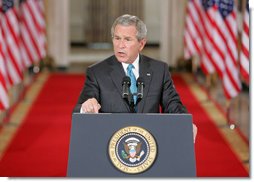 President George W. Bush has finally spoken out publicly regarding allegations that he and his adminstration are torturing prisoners in their custody. But not before milking the 9/11 trajedy for his own political benefit for all it's worth -- and more.
President George W. Bush has finally spoken out publicly regarding allegations that he and his adminstration are torturing prisoners in their custody. But not before milking the 9/11 trajedy for his own political benefit for all it's worth -- and more.
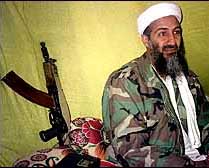 Having complied with Osama's wishes and withdrawn U.S. troops from Saudi territory, Bush seems to also have abandoned the hunt for 9/11's self-confessed mastermind. Back on September 13, 2001 Bush told the nation, "The most important thing is for us to find Osama bin Laden. It is our number one priority and we will not rest until we find him." Less than a year later, Bush was telling us, "I don't know where bin Laden is. I have no idea and really don't care. It's not that important. It's not our priority."
Having complied with Osama's wishes and withdrawn U.S. troops from Saudi territory, Bush seems to also have abandoned the hunt for 9/11's self-confessed mastermind. Back on September 13, 2001 Bush told the nation, "The most important thing is for us to find Osama bin Laden. It is our number one priority and we will not rest until we find him." Less than a year later, Bush was telling us, "I don't know where bin Laden is. I have no idea and really don't care. It's not that important. It's not our priority."
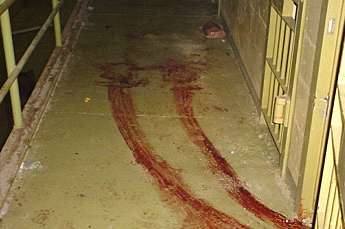 President Bush: "Working with our allies, we've captured and detained thousands of terrorists and enemy fighters in Afghanistan, in Iraq, and other fronts of this war on terror."
President Bush: "Working with our allies, we've captured and detained thousands of terrorists and enemy fighters in Afghanistan, in Iraq, and other fronts of this war on terror."
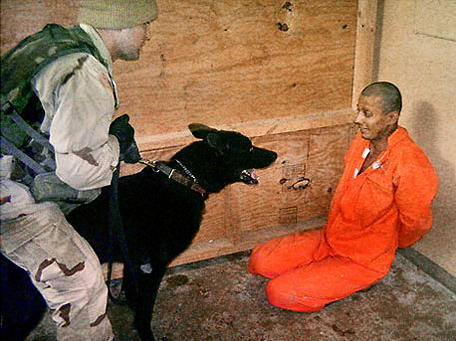 President Bush: "A small number of suspected terrorist leaders and operatives captured during the war have been held and questioned outside the United States, in a separate program operated by the Central Intelligence Agency. . . Many specifics of this program, including where these detainees have been held and the details of their confinement, cannot be divulged. Doing so would provide our enemies with information they could use to take retribution against our allies and harm our country. I can say that questioning the detainees in this program has given us information that has saved innocent lives by helping us stop new attacks -- here in the United States and across the world. "
President Bush: "A small number of suspected terrorist leaders and operatives captured during the war have been held and questioned outside the United States, in a separate program operated by the Central Intelligence Agency. . . Many specifics of this program, including where these detainees have been held and the details of their confinement, cannot be divulged. Doing so would provide our enemies with information they could use to take retribution against our allies and harm our country. I can say that questioning the detainees in this program has given us information that has saved innocent lives by helping us stop new attacks -- here in the United States and across the world. "
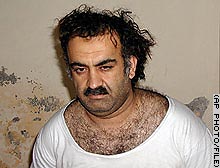 President Bush: "We knew that Zubaydah had more information that could save innocent lives, but he stopped talking. As his questioning proceeded, it became clear that he had received training on how to resist interrogation. And so the CIA used an alternative set of procedures. These procedures were designed to be safe, to comply with our laws, our Constitution, and our treaty obligations. The Department of Justice reviewed the authorized methods extensively and determined them to be lawful. I cannot describe the specific methods used -- I think you understand why -- if I did, it would help the terrorists learn how to resist questioning, and to keep information from us that we need to prevent new attacks on our country. But I can say the procedures were tough, and they were safe, and lawful, and necessary. "
President Bush: "We knew that Zubaydah had more information that could save innocent lives, but he stopped talking. As his questioning proceeded, it became clear that he had received training on how to resist interrogation. And so the CIA used an alternative set of procedures. These procedures were designed to be safe, to comply with our laws, our Constitution, and our treaty obligations. The Department of Justice reviewed the authorized methods extensively and determined them to be lawful. I cannot describe the specific methods used -- I think you understand why -- if I did, it would help the terrorists learn how to resist questioning, and to keep information from us that we need to prevent new attacks on our country. But I can say the procedures were tough, and they were safe, and lawful, and necessary. "
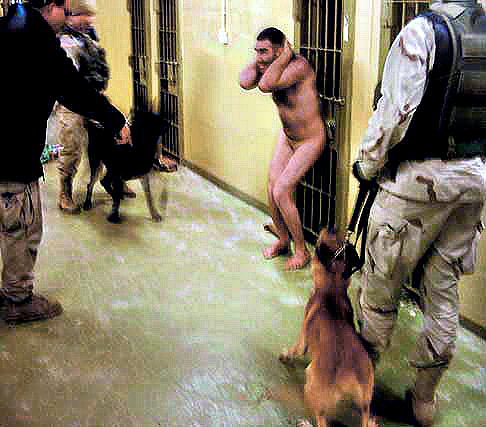 President Bush: "Soon after the war on terror began, I authorized a system of military commissions to try foreign terrorists accused of war crimes. . . the Supreme Court determined that military commissions are an appropriate venue for trying terrorists, but ruled that military commissions needed to be explicitly authorized by the United States Congress."
President Bush: "Soon after the war on terror began, I authorized a system of military commissions to try foreign terrorists accused of war crimes. . . the Supreme Court determined that military commissions are an appropriate venue for trying terrorists, but ruled that military commissions needed to be explicitly authorized by the United States Congress."
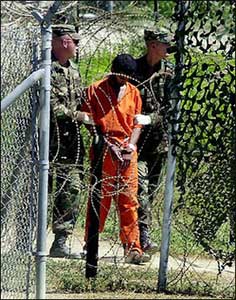 President Bush: "These men will be held in a high-security facility at Guantanamo. The International Committee of the Red Cross is being advised of their detention, and will have the opportunity to meet with them. Those charged with crimes will be given access to attorneys who will help them prepare their defense -- and they will be presumed innocent. While at Guantanamo, they will have access to the same food, clothing, medical care, and opportunities for worship as other detainees. They will be questioned subject to the new U.S. Army Field Manual, which the Department of Defense is issuing today. And they will continue to be treated with the humanity that they denied others."
President Bush: "These men will be held in a high-security facility at Guantanamo. The International Committee of the Red Cross is being advised of their detention, and will have the opportunity to meet with them. Those charged with crimes will be given access to attorneys who will help them prepare their defense -- and they will be presumed innocent. While at Guantanamo, they will have access to the same food, clothing, medical care, and opportunities for worship as other detainees. They will be questioned subject to the new U.S. Army Field Manual, which the Department of Defense is issuing today. And they will continue to be treated with the humanity that they denied others."
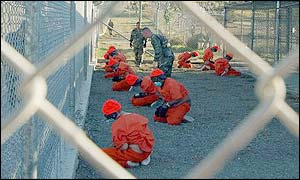 We will say this about this shameful Bush address on terrorism and torture, however begrugingly. And that is, it was a cleverly crafted and well-delivered speech that issued a direct challenge to his anti-war critics and the more than 60% of the country who oppose the war in Iraq. He -- or we should say Rove -- knows that few in the Republican friendly major media or the Congress are willing to point out the many distortions and lies this speech contains for fear of being accused of "supporting the terrorists."
We will say this about this shameful Bush address on terrorism and torture, however begrugingly. And that is, it was a cleverly crafted and well-delivered speech that issued a direct challenge to his anti-war critics and the more than 60% of the country who oppose the war in Iraq. He -- or we should say Rove -- knows that few in the Republican friendly major media or the Congress are willing to point out the many distortions and lies this speech contains for fear of being accused of "supporting the terrorists."